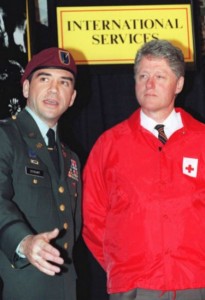
By Dan Lamothe
Thursday, June 12, 2014
Why the ‘Black Hawk Down” prisoner release is different than Bowe Bergdahl’s
advertisements
The Pentagon’s top lawyer on Wednesday compared the secret negotiations to obtain ArmySgt. Bowe Bergdahl’s release to the 1993 discussions that secured the freedom of an Army pilot whose helicopter crashed in Somalia, saying that in both cases Washington dealt with “non-state actors” to recover a U.S. service member held captive.That is true, but history shows that President Clinton and his administration responded much differently than President Obama’s in securing the release of Chief Warrant Officer-3 Michael Durant, whose 11-day captivity in Mogadishu was depicted in the best-selling book “Black Hawk Down” and the film of the same name.
 |
“The one example I’m aware of is the helicopter pilot, Michael Durant, in Somalia, who was held captive by the warlord Mohammed Aidid,” Preston told the committee. “There was a quiet, as I understand it, arrangement whereby the United States regained Durant’s freedom in, functionally, in exchange for individuals that were captured in the same operation.”
Durant was taken prisoner by Somali militia men after his UH-60 Black Hawk helicopter was struck with a rocket-propelled grenade and crashed on Oct. 3, 1993. Already severely wounded, he was taken captive by Somali militia men, and eventually turned over to Aidid, a powerful warlord in the region.
Like Bergdahl, Durant’s captors recorded a video of him to show that he was still alive and in their possession. But it wasn’t exactly a trade that secured the Army pilot’s release. Clinton sent retired Ambassador Robert B. Oakley and Marine Gen. Anthony Zinni to Somalia to see if they could get Durant and a Nigerian prisoner held by Aidid released. According to “Black Hawk Down,” by Mark Bowden, Oakley met with Aidid’s clan, and learned that Aidid would want 60 or 70 of his men who had been taken prisoner by U.S. Army Rangers in exchange for Durant.
Oakley responded that Clinton wanted Durant released immediately — without conditions. When the Somalis didn’t back down from their demands for his release, Oakley laid out a jarring concept to the warlords. His response, as captured in Bowden’s book and excerpted in the Philadelphia Inquirer:
“I’ll do my best to see that these people are released, but I can’t promise anything,” Oakley said. “I’ll even talk to the President about it, but only after you’ve released Durant.”
Oakley was careful to say, “This is not a threat,” but then he laid out a chilling scenario. He offered it as friendly advice.
“I have no plan for this, and I’ll do everything I can to prevent it, but what will happen if a few weeks go by and Mr. Durant is not released? Not only will you lose any credit you may get now, but we will decide that we have to rescue him. I guarantee you we are not going to pay or trade for him in any way, shape or form. . .
“So what we’ll decide is we have to rescue him, and whether we have the right place or the wrong place, there’s going to be a fight with your people. The minute the guns start again, all restraint on the U.S. side goes. Just look at the stuff coming in here now. An aircraft carrier, tanks, gunships . . . the works. Once the fighting starts, all this pent-up anger is going to be released. This whole part of the city will be destroyed, men, women, children, camels, cats, dogs, goats, donkeys, everything. . . . That would really be tragic for all of us, but that’s what will happen.”
After that meeting, Oakley told reporters at the time that he had refused to discuss a trade for Durant’s freedom.
“I’ve made it clear that, as far as the United States is concerned . . . it is important that both prisoners be released and that there be no bargaining,” he said at the time.
Durant was released a short time later as “goodwill gesture,” 11 days after he was taken prisoner, according to this U.S. Army account of the situation. Shortly after Durant’s release, Clinton insisted that no deals had been cut to secure the pilot’s freedom. However, the United States backed away from military operations in Somalia afterward, finding that there was no support for them there or at home. Some of Aidid’s men were eventually freed.
In a subsequent interview with PBS’s “Frontline,” television program, Oakley said he found dealing with Aidid to be complicated, but that he pressed him carefully.
“You had to use a combination of pressure and persuasion to do that–it was always very volatile,” Oakley told PBS. “I would treat him as if he were a vial of nitroglycerine that could go off in my hands, but you had to keep pushing him, you had to do it in a gentle way, you had to out-think him, make him understand that to his advantage, play upon his pride rather than try to humiliate him and being all always alert to that sensitivity with the fact that he could flash and revert to violence.”